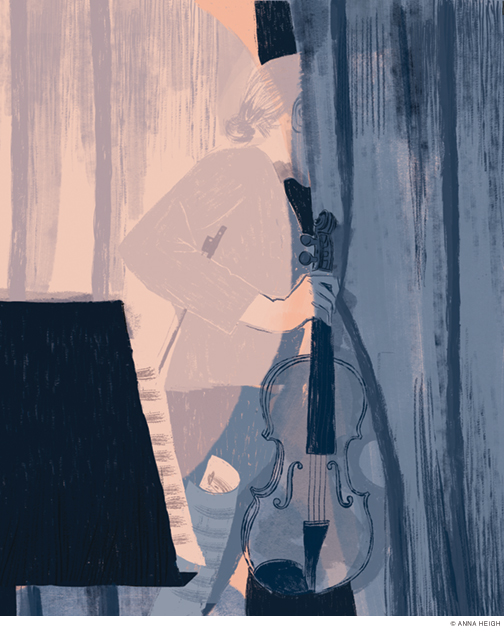
Maybe you should, too.
By Rachel Friedman
I’m sure learning how to play viola must have been awkward at first: balancing an hourglass-shaped wooden chamber between my eight-year-old chin and shoulder, figuring out the right amount of bow pressure to avoid squeaking, teaching my fingers the unforgivingly specific coordinates of each individual note. But what I remember most is feeling an immediate and deep connection to my instrument, a sense that we were a perfect fit. I remember the feeling of falling in love.
No wonder, then, that I spent most of my childhood planning to become a professional musician. And with supportive parents, top-notch teachers, and summers at the vaunted Interlochen Arts Camp, why couldn’t I? I had talent, I had drive, and I had 10,000-hour discipline way before Malcolm Gladwell made that a thing. Most of all, I had a Path. From a very early age I knew exactly what I wanted and the necessary steps to get there, and I was positive I knew how deeply satisfying it would be once I arrived.
Then I went to college, where I buckled almost immediately under the intensified pressure of auditions and performances. This was not how it was supposed to go. I knew music school was supposed to weed people out. I’d just assumed it would be other weeds. And certainly not that I’d be the first to get yanked from the garden. But of the three freshman viola majors in my program, I was the weakest. So I did what every aspiring artist is trained to do: I put in more and more hours of practice. Once a week I’d call my dad sobbing, unable to explain exactly why I was so overwhelmed and miserable doing the thing I had loved for as long as I could remember. But I was stuck. What else was I going to do? Quit? Fail?
Surely not. If I’d been taught anything as a kid, it was that the biggest bludgeon I had to beat back failure was perseverance. We’re taught as kids to keep our commitments. Play the whole season. Practice 15 minutes a day. Show up for your weekly study group. Giving up is seen as a character flaw, no matter the endeavor. The mentality that we can achieve anything with enough hard work—and that we have a moral obligation to try, try, and try again—is part and parcel of the American dream.
Our fear of failure drives us to absurd lengths to pretend the very act of failing is something else entirely. Silicon Valley’s relentless optimism fills bookstores with titles like The Up Side of Down: Why Failing Well is the Key to Success and Failing Forward: Turning Mistakes into Stepping Stones for Success. Fail up. Fail smart. Fail forward. Poor Samuel Beckett’s out-of-context “Fail again. Fail better” quote is bandied about so aggressively on Twitter by Burning Man–going, productivity-hacking tech bros that you might think Beckett was a motivational speaker and not a depressed Irish nihilist.
I was most definitely not failing “up” at music school. My private lessons brought waves of nausea. Panic attacks interrupted my sleep. One morning, faced with a Kreutzer etude, I was seized by the sudden urge to break my bow in half. What a relief it would be, I thought, to just break it and be done once and for all. Instead I put my instrument in its case and shakily backed away.
The American concept of failure has an interesting history. Before the Civil War, failure was a term reserved for failed businesses. It meant “breaking in business” (i.e., going broke). In the 19th century, failure and other terms from finance slowly crept out of business jargon and into the ways people talked about themselves. Failure became more than something that a person experiences; it became an identity. The historian Scott Sandage argues that by the 20th century there had been a definitive transformation: the concept of failure conjured up not merely lost business but also lost souls (because today, what we do for a living is who we are).
“We reckon our income once a year but audit ourselves daily, by standards of long-forgotten origin,” Sandage writes. “Who thinks of the old counting house when we ‘take stock’ of how we ‘spend’ our lives, take ‘credit’ for our gains, or try not to end up ‘third rate’ or ‘good for nothing?’ Someday, we hope, ‘the bottom line’ will show that we ‘amount to something.’ By this kind of talk we ‘balance’ our whole lives, not just our accounts.”
Cast in those terms, failure is the one thing to which we must never succumb. So we soldier on—succumbing instead to the terms themselves.
I quit viola before the end of my freshman year. I declared myself all washed up at the tender age of 19, directionless, purposeless, ordinary. Looking back, I can see that part of what hit me so hard was being disabused of the naive belief that my plan for my adult life would work out exactly as I envisioned. In the moment, though, what stung was failure—which seemed less like something I was experiencing than something I was.
I’m not talking about the everyday rejections that come with trying to make a living in the arts (and in many fields). I had bounced back from many a mediocre audition, and music had thickened my skin enough that later, when as a freelance writer I started pitching ideas to editors, I (mostly) didn’t take rejections personally. And of course making art is in itself a daily lesson in failure because the gap between what you envision and what you produce never fully closes.
But whenever I’ve experienced major disappointment in my adult life—quitting the viola, getting divorced, having a book I’d poured years into get rejected—the moments when I was forced to modify the Grand Vision for my life, well, that was another story. “Follow your dreams,” we’re told, without a whole lot of substantive advice about how to handle things not working out as planned.
Over the years I’ve tried reframing my feelings of failure by reading spiritual authors like Eckhart Tolle and Louise Hay. I’m as tempted as the next neurotic New Yorker by anyone who comes along promising serenity through nonattachment, affirmations, and positively manifesting my destiny. We don’t like to talk about the experience of disappointment. We see it as negativity, as not spinning your failure as opportunity, as breaking the Faustian pact of Instagram-filtered perfection, or as questioning the fundamental American belief in the cause-and-effect relationship between hard work and reward. Get your vision board. Get your gratitude journal. Get your can-do attitude and mantras and wash your face, girl.
But … I don’t know. Somewhere along the way I always get frustrated by the premise that we have a mind-over-matter relationship with everything from our illnesses to our love lives to our finances. I don’t want to be a victim of my circumstances, but surely I don’t have control over everything.
Commitment is a good skill to cultivate, but maybe we should also have a mandatory class for all college freshmen about how to gracefully quit something you’ve given a good go and no longer want to invest in. It would offer up strategies for how to disentangle yourself from your childhood ambitions, how to stop comparing yourself to others, and how to accept failure and loss as part of growing up.
How about some books that celebrate the freedom of letting go of our dreams and moving on to other pursuits? Or that say it’s natural sometimes to hit the limits of our ambition, talent, or desire? How about we stop telling people that they failed because they weren’t determined enough? Sure, sometimes that’s true. But not all the time. There must be some middle ground between identity-rattling despondency and all-conquering optimism when it comes to failure, a space where we can accept setbacks without becoming victim to them—but also without needing to mythologize them as mere stops on the way to success.
I quit viola because I no longer felt joy when I played it. Of course that can happen.
A self-help book would probably encourage me to reframe it all within a revisionist history: one tracing my transformation into a writer, as though that had been my actual Path. Which might have worked. There was enough truth there to sustain that delusion. But the fact was that quitting viola was a kind of failure. I failed to achieve a thing I had set out to achieve. What I know now is that it’s less useful for me to deny the idea of failure than to learn how to distance my ego from it. It’s OK that I failed to become what I’d envisioned. It will likely happen again at some point in my life, maybe many times. And when it does, I want to give space to my capital F failures, and then I want to let them go.
From And Then We Grew Up by Rachel Friedman C’03 G’07, published by Penguin Books, an imprint of Penguin Publishing Group, a division of Penguin Random House, LLC. Copyright © 2019 by Rachel Friedman.




